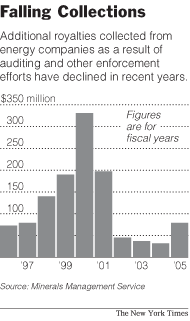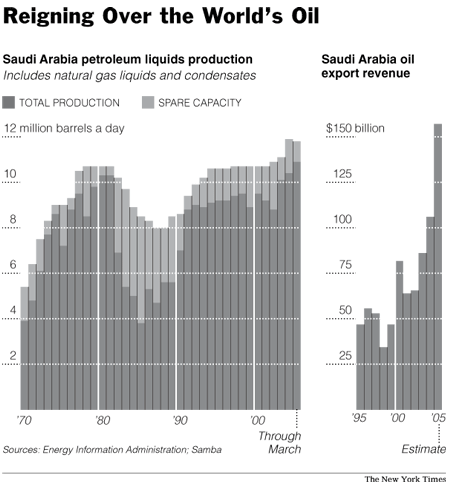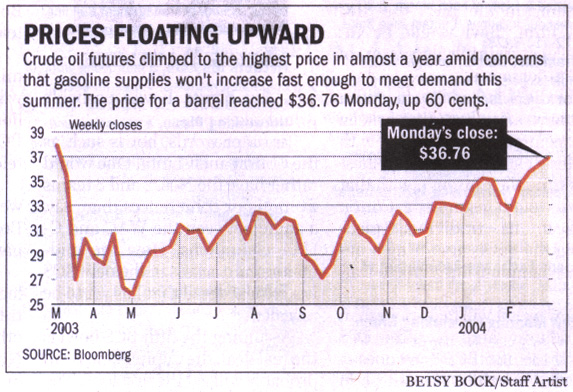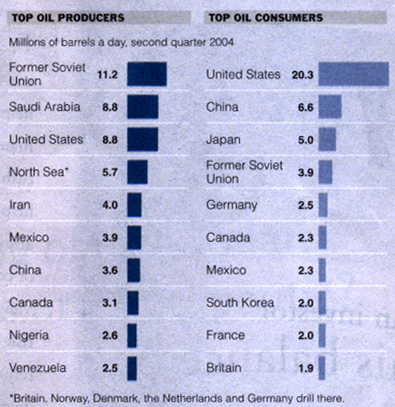The decision also sets a precedent that could make it easier for oil and gas companies to lower the value of what they pump each year from federal property and thus their payments to the government.
The reversal in the case, which involves Chevron’s accounting of natural gas sales to a company it partly owned, has renewed criticism that the Bush administration is reluctant to confront oil and gas companies and is lax in collecting royalties.
“The government is giving up without a fight,” said Richard T. Dorman, a lawyer representing private citizens suing Chevron over its federal royalty payments. “If this decision is left standing, it would result in the loss of tens of millions, if not hundreds of millions, of dollars in royalties owed by other companies.”
In return for the right to drill on federal lands and in federal waters, energy companies are required to pay the government a share of their proceeds. Last year, businesses producing natural gas paid $5.15 billion in government royalties.
But the Bush administration has come under fire on Capitol Hill for its record on collecting payments. While the Interior Department has sweetened incentives for exploration and pushed to open wilderness areas for drilling, it has also cut back on full-scale audits of companies intended to make sure they are paying their full share.
[F]our government auditors last month publicly accused the Interior Department of blocking their efforts to recover more than $30 million from the Shell Oil Corporation, the Kerr-McGee Corporation and other major companies.
“This latest revelation proves that the Bush administration is incapable of preventing big oil companies from cheating taxpayers,” said Representative Edward J. Markey of Massachusetts, a senior Democrat on the House Committee on Resources. “The public has been systematically fleeced out of royalties that these companies owe for the privilege of drilling for oil and gas on lands belonging to all of us.”
Interior Department officials have shown little interest in evidence from either New Mexico’s experience or a current court fight with Chevron over federal royalties.
On July 11, three weeks before the department dropped its case against Chevron, Mr. Dorman and other lawyers involved in a Texas lawsuit against Chevron wrote to Interior Department officials. The lawyers, who represent a whistle-blower seeking to recover money for the federal government, said they were suing Chevron over the same issues the department had raised.
“All we were saying was that they should wait to see what evidence we turned up, and that we would gladly share everything we had with them,” Mr. Dorman said. His firm faxed a letter to the policy appeals division. Getting no response, the lawyers sent a copy by U.P.S. Six days later, it was returned. The reason, according to the U.P.S. label: “Receiver did not want, refused delivery.”
Source: "U.S. Drops Bid Over Royalties From Chevron " By EDMUND L. ANDREWS - NY Times - October 31, 2006
[T]he alternatives to Saudi Arabia are fewer today than seemed to be the case just three years ago. Predictions of a boom in Iraqi oil have been proved wrong; Iran, OPEC's second-largest oil producer, is locked on a collision course with the West; Venezuela is following an erratic path; and Russia's commitment to market reforms and foreign investments seems increasingly unreliable.
All this has added to Saudi Arabia's already impressive clout. What is more, other powers - mainly from Asia - seek greater access to its resources and have been increasingly courting the Saudis. "They can play the United States against other buyers, like China," Mr. Seznec said. "And why wouldn't they?"
About 1.5 million barrels a day make it to the United States, about 15 percent of American imports.
American officials, furious over Saudi Arabia's handling of the investigations after 9/11, recognize this new reality. The warmer relations between Saudi Arabia and the United States were on display last April, when Crown Prince Abdullah - who succeeded his half brother, Fahd, on Monday as king - visited President Bush's ranch in Crawford, Tex. As a sign of public diplomacy, and personal bonds, they kissed on the cheek and held hands.
Even the contentious issue of high oil prices has been smoothly swept under the rug. Over the last two years, crude oil prices have more than doubled, and closed yesterday at a record $62.31, up 1.5 percent on the New York Mercantile Exchange.
After the attacks on New York and Washington of Sept. 11, 2001, Saudi Arabia's position as the supplier of choice was threatened. Fifteen of the 19 hijackers were Saudi nationals, and the man who inspired the attacks, Osama bin Laden, was born in Saudi Arabia; and Saudi funds had financed Taliban schools in Afghanistan. To make matters worse, Saudi intelligence agencies dragged their feet in sharing information with their American counterparts.
Source: "Why America Is More Dependent Than Ever on Saudi Arabia" By JAD MOUAWAD - NY Times - August 6, 2005
Exxon Mobil Corp. recorded another quarter of strong profit, as commodity prices remained high and refining profit surged.
Amid tight gasoline supplies and record prices at gas pumps nationwide, the Irving-based oil giant recorded its highest first-quarter refining profit in 13 years.
Source: Dallas Morning News -- 4/30/04 -- "Exxon's profit rises 14 percent" by Sudeep Reddy
"Let us rid ourselves of the fiction that low oil prices somehow are good for the United States." -- Dick Cheney - 1986 - as U.S. Rep from Wyoming
Source: Dallas Morning News -- 4/12/04 -- "Who Profits?" by Froma Harop for the Providence Journal
Congress has refused to set new mileage goals [for automobiles]. Worse, they excluded from the existing requirements light trucks and SUVs, the fastest-selling vehicles.
Contributing even more to the trend, they extended an extraordinary tax benefit to the gas guzzlers, so drivers who used a vehicle for work could write off the cost on their tax returns -- even as much as $38,200 toward a new Hummer H2 that gets only 10 m.p.g….The tax-cutting bill signed into law in May [2003] expanded the write-off to $100,000.
Source: Time - July 21, 2003 -- "The New Energy Crisis" - Donald L. Bartlett and James B. Steele
The US just invaded and now controls Iraq, the country with the 2nd largest oil reserves on the planet. Yet oddly enough, US gasoline prices continue to spiral out of control.
Gasoline reserves nationwide fell [to a] nine month low, according to the Energy Department. The price of wholesale gasoline for September [2003] delivery soared 9.57 cents, or 9.5%, to $1.10 a gallon on the New York Mercantile Exchange after experiencing its biggest intraday spike since 1991. Texas consumers are feeling the effect…with prices hovering around $1.60 per gallon. In California, prices are already above $2 per gallon, the highest level since April [2003].
Source: Dallas Morning News - "Gasoline Prices Rising" by Roger Yu -- 8/22/2003
"Crude oil on the New York Mercantile Exchange rose Friday [3/5/2004] to the higheset level …since March last year [2003]"
Source: Dallas Morning News -- 3/6/04

Source: New York Times - 9/21/06

Source:

Source: Dallas Morning News - 3/2/2004

Source: Energy Information Administration via New York Times - 1/3/05